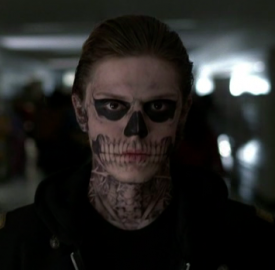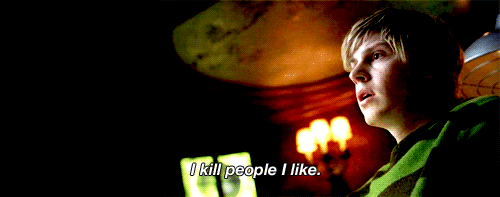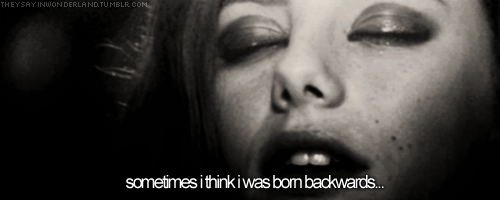Nash Harvey [d2] [*fin]
Aug 17, 2010 2:09:03 GMT -5
Post by aya on Aug 17, 2010 2:09:03 GMT -5
{Two; the Antlers}
Nash Harvey;
Female;
District 2;
Eighteen;
{colors}
{looks can be deceiving}
Well no one's going to fix it for us, no one can
You say that, "No one's going to listen, and no one understands."
So there's no open doors and there's no way to get through
There's no other witnesses, just us two.
There's two people living in one small room
From your two half-families tearing at you
Two ways to tell the story (no one worries)
Two silver rings on our fingers in a hurry —
Two people talking inside your brain
But he doesn't really mean to be so arrogant. His father massaged his ego from the cradle, and it's all he knows. There's no reason to blow such a small disagreement out of proportion — you've forgiven him before, so there's no reason this time should be any different. Let it be, just keep the peace...[/i][/blockquote]
Two people believing that I'm the one to blame
Two different voices coming out of your mouth
While I'm too cold to care and too sick to shout
[/size][/color]
Nash Harvey;
Female;
District 2;
Eighteen;
{colors}
{It's not evil, per se, but it's certainly more entertaining} - AF1E2D
{do it if you want to} - 808080
{It's the right thing to do, and you know it} - 50729F
{Say it. Out loud.} - 8B4789
{looks can be deceiving}
In general, Nash is an average-looking girl. On the small side, she has a sort of wiry build about her. She's shorter, around five foot four, thin, and springy. Nash is an agile sort of Career-tribute (although that was an on-again, off-again sort of training) with a sort of whimsical rhythm to her step.
Her hair is a dark brown, just above her shoulders, and always worn loose. Especially with its waviness, Nash's hair is the key trait in her appearance that seems to give a bit of insight to her constant internal conflict. It always seems a bit disorderly, frazzled. The ends have a habit of splitting and fraying, and her part is always crooked, criss-crossing over itself in a childish way.
Her eyes match her eyebrows: dark brown, hinting towards an overall appearance of being shocked. They're round and full, sitting beneath arched eyebrows — also dark — that give the impression of knowing more than she cares to reveal.
The pale skin of her face is dotted with nothing more two moles: one on her forehead, above her left eyebrow; the other on her right cheek. Her nose is thin, giving her face a sort of curious, mousy appearance, and contrasting to her angular jaw. Her face makes Nash seem a year or so younger than she actually is, which is both a blessing and a curse to the girl.
Well no one's going to fix it for us, no one can
Nash Harvey has been dragged to therapists, psychologists, psychiatrists, medical doctors, neurologists — every specialist in every high-up place, with her father utilizing every professional connection he'd ever made, and then some. Trying to be fixed when she didn't consider herself to be broken was the most frustrating experience for her. Then-fourteen Nash cursed herself up and down for even mentioning — why had she told him? What was going on inside her head hadn't been her mother's business, so there really hadn't been any reason to bother the prominent cardiothoracic surgeon. She'd just meant to make passing conversation with her father — something she was by no means good at — and she didn't mean anything by it, didn't mean for anything to come of it.
It didn't really matter, anyhow. By the second shrink, they'd already put a name to Nash's thought patterns. Doctor Lisabeth Harvey, however, hadn't been willing to accept that her only daughter could be anything less than a perfect career tribute (as the older woman had been) and brought Nash in to see all the professionals she knew whose field of study was even remotely connected to Nash's brain. It made the young teen clearly miserable, and, though he'd noticed, her father had done nothing to intervene in his wife's tirade.
You say that, "No one's going to listen, and no one understands."
Lysander Harvey, a geriatric nurse, had a good deal more experience with mental disorders than his surgeon of a wife, whose patients were typically unconscious as she dealt with them. But he was a very passive man, and had always been submissive to the Doctor Harvey's will. He, of course, did try to connect with his daughter, who was struggling inside her own head, but it was too little, too late. Nash blamed Lysander for her mother's obsession with "getting that little head thing of yours sorted out."
Nash became furious with the both of them, with her mother's refusal to accept Nash's mental difference and her father's inability to stand up to his wife. One night, she stormed out, vowing to never speak to either of them again. The next day, she felt guilty, and trotted back to their home, tail between her legs, after a long, strenuous battle between the forces at work in her head. Her father's attempts to reach out to Nash diminished, and Dr. Lisabeth Harvey's obsession over fixing the girl turned into depressed defeat, which in turn grew into resentment.
So there's no open doors and there's no way to get through
The huge rift between perfectionist Lisabeth and her clearly imperfect daughter led to Nash's complete social bloom. The teen never wanted to be home at night (when her mother was) if she could help it, and started staying out later and later, ultimately becoming a creature of the night herself. Nocturnal Nash gave up on trying to speak with her mother at all (and her father the sheep along with it) and stopped coming home to crash at all, preferring to take her daytime naps on friends' sofas or occasionally in a back room at the morgue (although it was cold and reeked of formaldehyde) where her cousin worked.
It hadn't taken long for Dr. Harvey to change the locks, and it didn't take much more time than that for the surgeon to pretend she didn't have a daughter, or that Nash had tragically died. Lysander said nothing as his wife did this, but instead began stealing painkillers from his work.
There's no other witnesses, just us two.
Social as she may appear to be, Nash is very much alone in her own head — or not at all alone, depending on how you look at it. In a very cartoonish style, she's got two voices in her head — an angel, so to speak, and a devil. She sees the world from a largely neutral perspective, but is completely unable to act on anything without both sides attempting to sway her. You have to forgive the poor girl for seeming indecisive sometimes, every possibility goes through a fierce debate before Nash ultimately reaches her decision.
You'd think that having a good and evil voice trying to sway her in one direction or the other would make it easy for Nash to behave perfectly, or as valiantly as possible, but it isn't so. The two voices are largely indistinct — it is very difficult for the schizophrenic teen to tell them apart.
Some days, depending on her mood, the seraphic representation in her head will be more powerful than the demonic voice, but this is rarely the case. If one voice is to be heard louder, it is most likely to be the malicious of the two, which feeds off of Nash's guilt, anger, depression, and all the lovely negativities that come with growing up in Panem.
There's two people living in one small room
Nash tries to make sure the voices have as little impact on her day-to-day life as possible, and they will keep quiet, so long as no major decision-making needs to be done. When a moral dilemma presents itself, however, efforts to subdue them are futile at best. It gets to be stressful, having two polar opposites camped out in her brain. The two voices are constantly warring with one another, with Nash caught in the crossfire.
The teen fancies herself to be something of a babysitter, although, in reality, she's the host organism — it's the voices that are more in charge. The two of them have a large persuasive hold over Nash's decisions, and it's impossible for that to change (Nash's mother tried.) The good and the evil sides bicker worse than a married couple, often ignoring Nash herself. Having the constant internal arguments makes Nash feel as though she's cramped in a tiny apartment with the two least compatible people in the world.
From your two half-families tearing at you
The teenager has two kinds of company: physical and mental. She's never alone. The voices, two sides of one coin, have a bigger hold on her life than she'd like to ever admit, and that she'd ever like to come to terms with. So Nash tries to drown them out with an excess of 'friends.' The trouble is that most of them aren't too close — acquaintances, really — and don't know about the constant warring inside her head.
Some of them are terrible influences on her — there have been seldom recorded cases of the two voices agreeing, yet both decided that Nash should not keep the company of several of them — while others are simply there. Most are actually rather unhelpful, but Nash collects friends. If she's left alone, then she's left alone with the good and the evil, and their volume, so to speak, escalates (or seems to) to an unbearable level. She refuses to be left to herself, not because she's lonely — but because alone is all she really wants to be.
Two ways to tell the story (no one worries)
It's been more or less the same since Dr. Harvey changed the locks on the door two years ago. Nash has mostly managed to return to a daytime schedule, and keeps herself occupied with other people. She listens to other people, but doesn't share much of her own life or her own problems; she figures that if she delves into the lives of other people deeply enough, she won't have to focus so much on her own thoughts, and won't have to face so many moral dilemmas.
It's interesting, though — The actual, unbiased recounting of any particular story is difficult for Nash to recall. She can try to retell it in her own words, but every step of the way, she has to fight the Two in her head. The good voice often prods Nash to sugar-coat any information that may result in distress for other people, while the evil will insist that Nash twists the words, inserts bits of information, and otherwise damage her accounts in order to wreak as much havoc as possible.
Two silver rings on our fingers in a hurry —
The voices in her head, the Two, as she has begun calling them, have led Nash to be quite superstitious. She doesn't believe in God, per se, or a god, or gods, or the etcetera. But she does believe in demons, and found a sense of enlightenment when she met someone else, a wiry boy a few years older than her by the name of Noam.
Noam believed in demons, too, from psychotic drugs combined with something personal that Nash had never asked about — because that was something she never wanted asked about herself; the results had been fairly catastrophic when word of Nash's Two reached her mother's ears. But from the start, Noam and Nash hit it off. They grew closer than Nash had grown to her other 'friends' (the others had been more like distractions) even though their relationship remained platonic.
With good things never lasting very long in Panem, Nash's best friend snuffed out his own life some six months after they'd met. He'd left her a short letter — "One for each side of the story." — along with two plain silver rings. Somehow, Nash construed her friend's parting gift to be an amulet of sorts, two trinkets to give her some control over the Two that had taken over her camp. She wears one on each index finger at all times — one for the good, one for the evil.
Two people talking inside your brain
He's got it coming to him, you know that. Everyone's put up with his ego and his bullying for much longer than they ought to have. Someone's got to step up and actually do something about it, and it may as well be you. Why let someone else take the credit for it? You'd be hailed a hero.
But he doesn't really mean to be so arrogant. His father massaged his ego from the cradle, and it's all he knows. There's no reason to blow such a small disagreement out of proportion — you've forgiven him before, so there's no reason this time should be any different. Let it be, just keep the peace...[/i][/blockquote]
Two people believing that I'm the one to blame
Nash herself doesn't even know what she had meant to do, what her plan had been. There had been the fighting in her head to follow the fighting in the warehouse that had been used as a common training facility among the many Career tributes of District Two (Nash herself was an on-and-off sort of Career. She'd trained pretty hard when she was younger, because her mother had insisted, but as the Victor obsession took back seat to the fixation on fixing the 'problems' in Nash's head, so had her training. After moving out, she returned to half of her original regimen.)
Staffan, a boy one year younger than Nash that no one ever seemed to get along with, had insulted her in a manner that she wasn't used to — he'd insisted that her bedroom behavior was quite dissolute and extremely inexpensive to purchase (in fewer, less eloquent words.) and remarked that she ought to give him a go for free. It was ridiculous — Nash hadn't been with anyone at that point, and had her sights on a girl rather than a guy — but it made her blood boil none the less, and talking her out of revenge would be some task for the more guilt-ridden half of her Two.
She just leapt at him, and not in the way that he'd suggested she should, and began beating the other boy into submission (again, not in the fun way for him.) She'd fractured three of his ribs and a zygomatic bone (cheekbone) before she was finally pulled off of him. Neither of the Two was at all pleased with the result — the villainous side had wanted Nash to beat Staffan to death, whereas the pacifist made Nash feel guilty for doing anything to the boy at all. She'd messed up, and they'd both agreed, leaving her feeling horrible for weeks.
Two different voices coming out of your mouth
She'd ultimately caved in to the good's way of thinking and went to visit the beaten Staffan at his home, intending to apologize. She'd even started to, giving up some ground (she refused to tell him that she hadn't meant it, however — of course she'd meant it) and say that maybe she hadn't been completely justified in beating him up.
The tide of her apology had turned quickly, however, as the other voice managed to gain more control over Nash's rationalization for the apology. She quickly went from sincerely apologizing to sarcastically apologizing, to openly mocking Staffan, to coming very close to attacking him again. She was escorted from the premises by Staffan's former-career older brother, who suggested that she not return. She didn't.
While I'm too cold to care and too sick to shout
It bothered Nash that she was no longer bothered by the things that used to freak her out. After the violent incident with Staffan, Nash sunk into a rather depressing period of apathy. She'd gotten the Two to agree, of course, which was no small feat, but had sacrificed her own self to a serious length of berating from them. It made her grow weary, uneasy on her feet, and let life lose its spice.
She stopped being as careful about guarding her Two from the rest of the world, stopped caring who knew that she had her two demons, the way Noam had his demons — the sort of demons that few seemed to genuinely have, simple vice aside. At that point, it seemed, her voices abandoned her. It was just Nash, Nash by herself. Purely Nash. On her own, alone at last in the way she'd longed to be for years. And she couldn't stand it. She didn't know how to be Nash by herself, Nash without her Two.
Fortunately for her, it seemed the voices were merely playing a practical joke of sorts: they had returned within a month. Nash quickly returned to being Nash as the world knew her, and has once more been the 'normal' Nash for a month and some-odd days.
[/size][/color]
































































